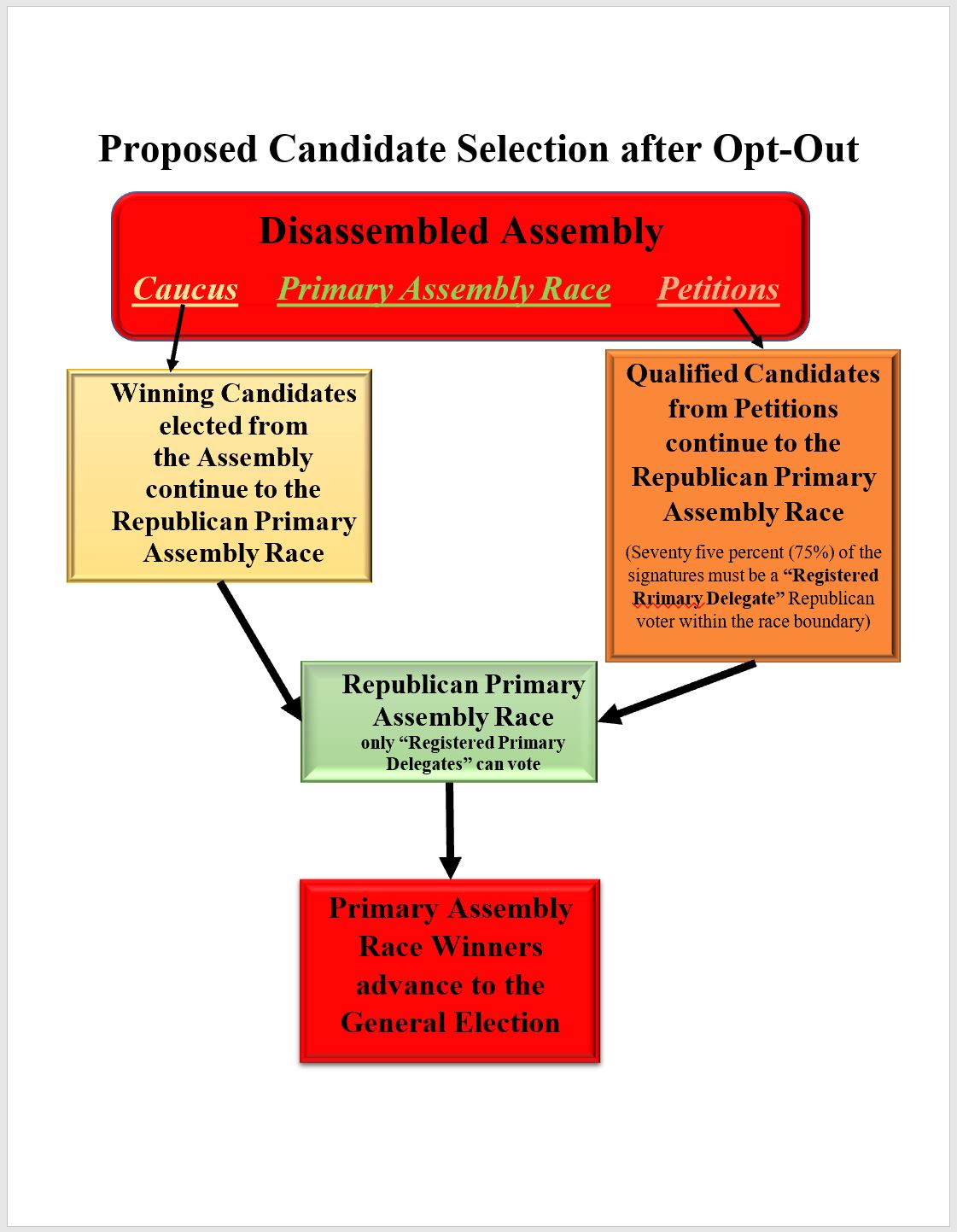By Ben Nicholas
Friends,
If we opt-out, it is true that the statutes (C.R.S. § 1-4-702(2)) require our party to use the caucus assembly method in the selection of our party’s nominee. The method itself limits the selection of the Republican candidate to only those delegates who have been voted forward through the caucus system. That method will in fact disenfranchise over a million Republican voters who have become accustom to receiving a ballot even though few use them.
A clever trap has been laid for us; the establishment side of our party has alleged that our team is trying to disenfranchise over a million Republican voters. This is false, we must respond with a rational proposal in which all Republicans can continue to participate if they choose. If we fail to do so we will be guilty as charged.
Many people have asked the question what happens if we opt-out; what I propose is similar to a pre-2016 system through bylaw changes that will allow an internal caucus and petition system. This new system is what I call a Disassembled Assembly.
A Disassembled Assembly is a multi-tiered assembly, each tier being conducted at different times. The Disassembled Assembly ends with the close of a Republican Primary Assembly Race.
- Caucus:
- Delegates from the caucus tier select their respective candidates.
- Petition:
- Petition tier candidates collect the requisite signatures.
- Republican Primary Assembly Race:
- The final tier is the determinative vote of all “Registered Primary Delegates” participating in the closed Republican Primary Assembly Race.
Caucus - Assembly/Convention Method:
The statutes (C.R.S. § 1-4-702(2)) require our party to use the caucus assembly method. This system requires the collection of fees to advance to whatever level the delegate desires. This system limits the time to two hours on one evening and those elected delegates are the only ones who can vote for candidates that will represent the party during the general election. I see no reason to abandon this system but I do believe we need to augment this system.
The following is the most important part of my proposal in the creation of this new Disassembled Assembly system, a new status or designation of “Registered Primary Delegate”.
Through bylaw changes we create a new optional status or designation for any registered Republican as a “Registered Primary Delegate”. Any qualifying registered Republican can acquire this status or designation by paying a small self-nomination fee of ($5 to $10) to the county party, part of the fees paid for this status or designation shall be used to cover the expense of the county party election.
The number of registered Republicans who can hold this status or designation is not limited. A qualified registered Republican must have a registration date of 120 days prior to the self-nomination of a “Registered Primary Delegate” status or designation.
This new status or designation allows a “Registered Primary Delegate” to vote in the closed Republican Primary Assembly Race, the election is conducted by the county Republican party.
Those Republicans choosing to stay as a registered Republican only, may not vote in the closed Republican Primary Assembly Race but should be encouraged to vote in the general election if they choose.
Petition Method:
In order for a candidate to qualify for the Republican Primary Assembly Race, he or she must gather the requisite number of signatures, as per State Requirements (see table 1 below) of which, seventy five percent (75%) must be “Registered Primary Delegates” within the race boundaries.
Republican Primary Assembly Race:
This tier of the Disassembled Assembly known as the Republican Primary Assembly Race, is a contest between the winner of the Assembly/Convention tier and candidates from the Petition tier who successfully gathered the requisite number of signatures. The winner(s) advances to the general election race.
Table 1: Primary Election: Major Party Candidate Petitions
|
Office |
Signatures Required |
|
Attorney General |
1,000 per congressional district |
|
County Offices |
1,000 or 10% of votes cast (whichever is less) * |
|
CU Regent, At-Large |
500 per congressional district |
|
CU Regent, District |
1,500 or 10% of votes cast (whichever is less) * |
|
District Attorney |
1,000 or 10% of votes cast (whichever is less) * |
|
Governor |
1,500 per congressional district |
|
Secretary of State |
1,000 per congressional district |
|
State Board of Education |
1,500 or 10% of votes cast (whichever is less) * |
|
State Representative |
1,000 or 30% of votes cast (whichever is less) * |
|
State Senator |
1,000 or 30% of votes cast (whichever is less) * |
|
State Treasurer |
1,000 per congressional district |
|
US Representative |
1,500 or 10% of votes cast (whichever is less) * |
|
US Senator |
1,500 per congressional district |
|
* The votes cast in the previous primary election for that office. If there was no primary, calculate based on votes cast in most recent general election for that office. |
|


